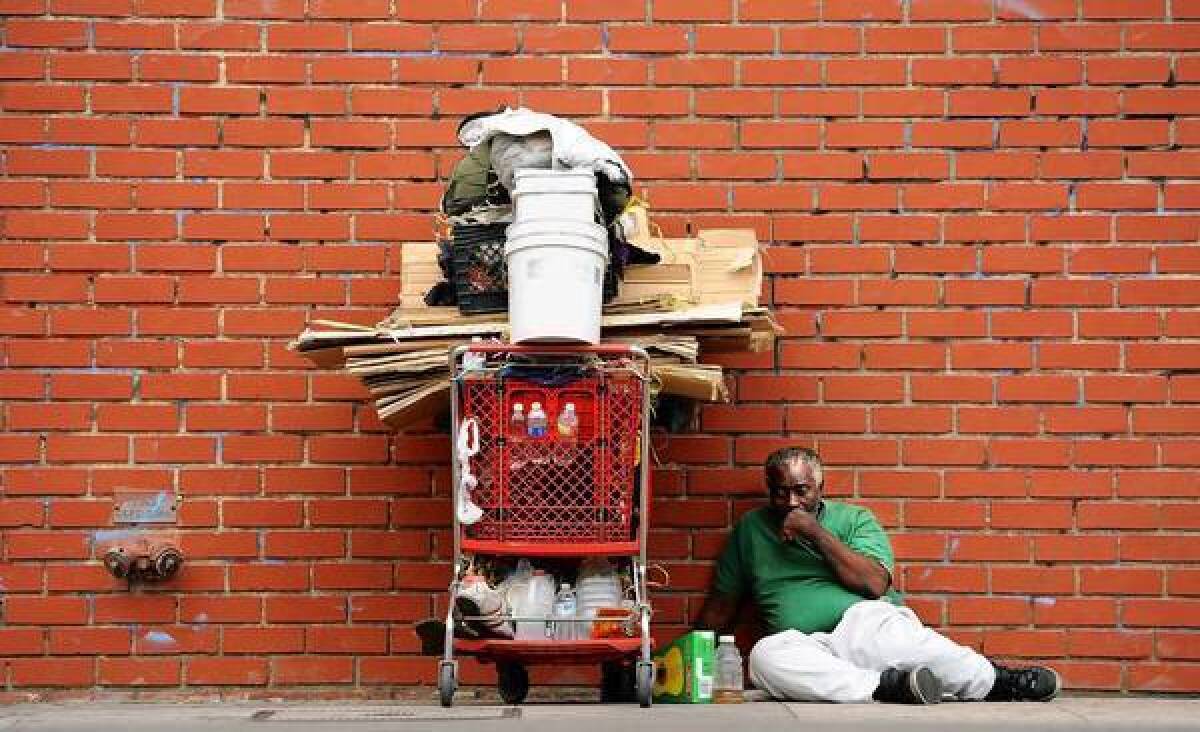Court rules that L.A. can’t destroy homeless people’s property

- Share via
Los Angeles and other cities are barred by the U.S. Constitution from randomly seizing and destroying property homeless people temporarily leave unattended on city streets, a federal appeals court decided Wednesday.
Upholding a court order against Los Angeles, a panel of the U.S. 9th Circuit Court of Appeals ruled, 2-1, that the personal possessions the homeless leave for a short time on city sidewalks may be taken only if the possessions pose an immediate threat to public safety or health or constitute criminal evidence.
Even then, the court said, the city may not summarily destroy the property and must notify the owners where they can pick it up.
Wednesday’s ruling came as cities across the state grapple with ways to keep streets clean and safe without running afoul of the rights of the homeless who live there.
“Look, it is a difficult situation, but the question is: Is there some exception when it comes to the homeless that you don’t destroy people’s property without due process?” said Carol Sobel, who represented the homeless in the case. “And the court said, no.”
Los Angeles’ skid row of 50 square blocks downtown is filled every day with as many as 7,000 people with no permanent home, and shelters can house only about 5,500 of them, she said. Those shelters require lodgers to leave during the day.
The dispute began after Los Angeles posted notices last year warning that a city ordinance required street dwellers to remove their possessions during certain clean-up days.
City workers, accompanied by police, seized and destroyed property they found unattended. On several occasions, the city confiscated property even when its owner was present, the court said.
Nine homeless people sued after losing their possessions, including personal identification documents, medications, family memorabilia, toiletries, cell phones, sleeping bags and blankets. The men and women had left their property in carts provided by social service groups.
A district court ruled for the homeless, and the city appealed. In upholding an injunction against Los Angeles, the 9th Circuit said a person does not lose his or her 4th Amendment protection from unlawful seizures by violating a city ordinance.
“Were it otherwise, the government could seize and destroy any illegally parked car or unlawfully unattended dog,” Judge Kim McLane Wardlaw, who was appointed by President Bill Clinton, wrote for the majority.
A dissenting judge argued the homeless had been given adequate warning to remove their possessions and were provided with a warehouse for storing them.
“Common sense and societal expectations suggest that when people leave their personal items unattended in a public place, they understand that they run the risk of their belongings being searched, seized, disturbed, stolen, or thrown away,” wrote Judge Consuelo M. Callahan, who was appointed by President George W. Bush.
An attorney for the city was unavailable to comment.
More to Read
Sign up for Essential California
The most important California stories and recommendations in your inbox every morning.
You may occasionally receive promotional content from the Los Angeles Times.











